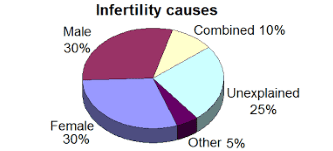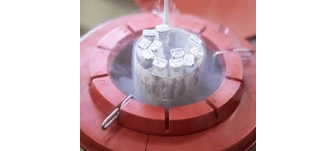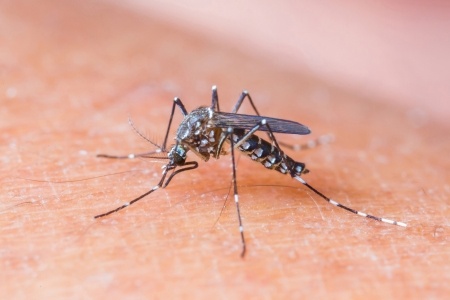Amy, a 48-year old marketing executive, and her second husband Diego were eager to give their young daughter a sibling, but were unable to conceive naturally. Recommended to Dr. Jane Frederick, the couple underwent one round of IVF to see if Amy could produce any of her own eggs. When she couldn’t, Amy recalls, “We were disappointed because we’d been so hopeful, but Dr. Frederick was also hopeful that egg donation might be a solution.” Within a week, the couple was matched with a donor. Out of the four viable fertilized eggs, they chose a male embryo and became pregnant...

Eat Your Way to Improved Fertility
Patients often ask whether their eating habits are affecting their fertility. There is evidence to suggest that modifying your diet may be a natural, low-cost option to improve your chances of conceiving, especially if you have certain infertility diagnoses, such as irregular ovulation and PCOS, or are undergoing IVF. The Nurse’s Health Study (NHS), one of the largest investigations conducted on female health habits, has provided clinicians with important information about the effect of diet on a women’s reproductive system. Why diet can have a positive or negative impact on fertility Carbohydrates, proteins and fats are all essential nutrients in...
Finding Dr. Right with Dr. Jane Frederick
As a same-sex couple, Anna Marie and Michelle Carreno-Bolong knew they would need assisted reproduction to fulfill their dream of becoming parents. Married for two years, the thirtysomething women love kids and are surrounded by them as owners of a children’s gym in Redondo Beach. In 2014, they excitedly decided to start their journey to parenthood and made several appointments with an Orange County fertility specialist. They were disappointed, however, when they did not feel the compassion they were seeking from a fertility practice. They decided to switch doctors after hearing about HRC Fertility and finding Dr. Jane Frederick after...

Unexplained Infertility Does Not Mean Untreatable
For couples who have been trying to get pregnant for month or even years, an unexplained infertility diagnosis can seem like a double blow–both physically and psychologically. They may be wondering how they will ever conceive if their doctor can’t figure out the case of their infertility. Here are several important points about unexplained that should give couples peace of mind. You’re not alone Unexplained infertility affects approximately 15 percent of couples. It is defined as the lack of an identified cause for a couple’s inability to conceive after 12 months (or six months for women 35 and older), despite...
Fresh Versus Frozen IVF Cycles
Since the 1980’s, frozen embryo transfers (FET’s) have been successfully utilized when patients have had excess frozen embryos remaining from a fresh cycle. But with older freezing methods, success rates were not as impressive. In recent years, however, several studies have demonstrated the increasing effectiveness of frozen IVF cycles, showing comparable, if not better, pregnancy rates to fresh IVF cycles. In fact, most IVF centers are now conducting more frozen cycles for certain types of patients over the more traditional ‘fresh’ IVF ones, making FET’s the first line treatment for many. Factors improving the success rate of frozen cycles There...

Fresh Versus Frozen IVF Cycles
For more than 30 years, frozen embryo transfers (FETs) have been successfully utilized when patients have had excess frozen embryos remaining from a fresh cycle. But with older freezing methods, success rates were not as impressive. In recent years, however, several studies have demonstrated the increasing effectiveness of frozen IVF cycles. In fact, most IVF centers are now conducting more frozen cycles for certain types of patients, making FETs the first line of treatment for many. Factors Improving FET Success Rates There are several reasons for the improved success. First, embryologists are now freezing embryos through vitrification, a rapid form...
Fourth Round of IUI = Beautiful Baby Girl
It was a rollercoaster ride, but Carrie can finally call herself a mother. After trying to conceive for 18 months, Carrie and her husband consulted a local fertility doctor who conducted preliminary testing and made treatment recommendations. Not long after, Carried and her husband moved to California after a job promotion. Carrie learned about Dr. Jeffrey Nelson, who was highly recommended, and immediately made an appointment so the couple could move forward with treatment. Things moved quickly after that. “Dr. Nelson accepted all the paperwork and test results from our first doctor, which saved us a lot of time and...

How Zika is affecting my patients trying to get pregnant
ZIKA IN THE U.S. by Kristin Bendikson, MD The Zika virus is frightening to those women who are pregnant living in countries where the disease is rampant. Most pregnant women in the United States are fortunate not to be burdened with these worries and concerns. As of June 8th there have been almost 700 cases of Zika infection in the United States in almost every state in the union. The majority of these cases have been caused as a result of travel to an affected country, however there are 11 cases of Zika infection from sexual transmission. The incidence of...

Enrich Your Chances of IVF Success with Vitamin D
What if there was an easy and inexpensive way to improve your fertility, overall health, and perhaps, improve your chances of IVF success? You would probably jump at the chance to use it. No, there isn’t a magic pill with guaranteed success, but infertility specialists, including our physicians at HRC Fertility, have recognized the importance of Vitamin D in both your reproductive and general health. So here are some facts about this vital vitamin, as well as suggestions for either maintaining or replenishing a healthy Vitamin D level. Vitamins all around us Generated by the sun and present in the...
Is it too late for women over 40 trying to get pregnant?
Trying to get pregnant after 40 By Dr. Kristin Bendikson Due to the recent announcement that at 49 years old, Janet Jackson is pregnant, I have been flooded with questions about how women who are older can get pregnant. Although it is common knowledge that age negatively impacts female fertility, a fact that has been emphasized recently due to the explosion in knowledge about egg freezing, many women still don’t grasp when it is just too late to get pregnant.The advent of assisted reproductive technology has changed the landscape of reproduction for older women trying to get pregnant, but has...
